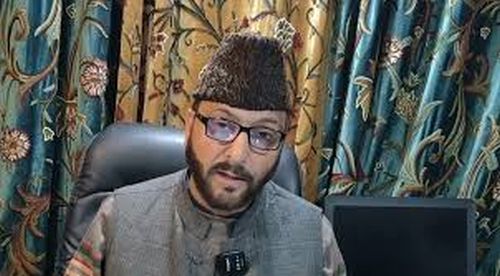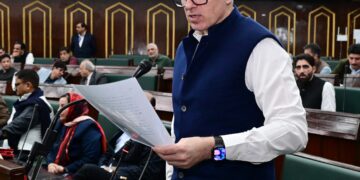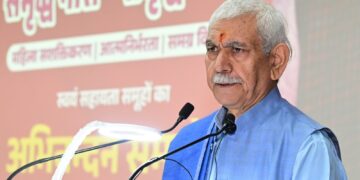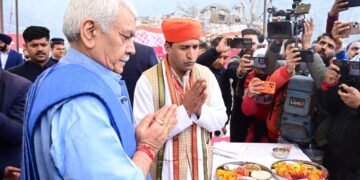Jammu: Five persons to be nominated by the Lieutenant Governor as members of the Jammu and Kashmir Assembly may play a crucial role in the formation of the next government in the Union territory, sources said on Monday.
The Congress, National Conference and the Peoples Democratic Party have opposed the nomination of the five members before government formation, and threatened to move the Supreme Court.
In August 2019, Article 370 — which gave Jammu and Kashmir special status — was revoked and the state was divided into two union territories.
According to section 15 of the Jammu and Kashmir Reorganisation Act, 2019, “Notwithstanding anything in sub-section (3) of section 14, the Lieutenant Governor of the successor Union territory of Jammu and Kashmir may nominate two members to the Legislative Assembly to give representation to women, if in his opinion, women are not adequately represented in the Legislative Assembly”.
The Act was amended in 2023.
The amendment says: “After section 15 of the principal Act, the following sections shall be inserted, namely: 15A. Notwithstanding anything contained in sub-section (3) of section 14, the Lieutenant Governor of the Union territory of Jammu and Kashmir may nominate not more than two members, one of whom shall be a woman, from the community of Kashmiri Migrants, to the Jammu and Kashmir Legislative Assembly”.
It also says, “15B. Notwithstanding anything contained in sub-section (3) of section 14, the Lieutenant Governor of the Union territory of Jammu and Kashmir may nominate one member from displaced persons from Pakistan occupied Jammu and Kashmir to the Jammu and Kashmir Legislative Assembly.”
These five nominated members will have the same powers and voting rights as other MLAs.
The Congress has already expressed its strong opposition to the nomination of five MLAs before the government formation in Jammu and Kashmir, dubbing any such move as an assault on democracy and the fundamental principles of the Constitution.
“We oppose the nomination of five MLAs by the LG before the government formation in Jammu and Kashmir. Any such move is an assault on democracy, the people’s mandate, and the fundamental principles of the Constitution,” Jammu and Kashmir Pradesh Congress Committee (JKPCC) senior vice-president and chief spokesperson Ravinder Sharma said on Friday.
National Conference president Farooq Abdullah said his party might go to the Supreme Court against any such move.
“The LG should first of all stay away from this process as a government is being formed. It is for the government to nominate people and send it (nominations) to the LG. That is the normal procedure.
“What they want to do, I do not know. However, if they do it, we will go to the Supreme Court. What is the point in making the government, if the Lord Sahib remains here? We have to fight against all this,” Abdullah said in Srinagar on Monday.
On the possible nomination of five MLAs by the LG, Jammu and Kashmir Congress chief Tariq Hamid Karra said that would amount to “rigging the poll results”, contrary to the basic concept of democracy and defeating the mandate of the people.
PDP leader Iltija Mufti termed the Centre’s move a “brazen pre-result rigging” of the polls.
“All of the five MLAs nominated by LG are BJP members or associated with the party. Brazen pre result rigging & shameful manipulation (sic),” she posted on X.
She said it seems no lessons were learned from the rigging of 1987 elections in Jammu and Kashmir.
“Might as well have nominated all 90 members instead. Why even hold elections? 1987s stolen election took J&K to the brink. Yet no lessons learnt?” she said.
The sources said that for the first time in Jammu and Kashmir, five nominated members of the assembly may have a significant role in forming the new government.
The LG is expected to nominate these members based on the advice of the Union Home Ministry, the sources said.
If the five members are nominated before the formation of the government, the J&K assembly’s strength will be 95, increasing the majority threshold to 48 seats to form a government.
The Jammu and Kashmir Assembly is modelled on the Puducherry Assembly where three nominated members function at par with elected MLAs and have voting rights.
Former Puducherry LG Kiran Bedi’s decision to nominate three members to the UT assembly without consulting the then Congress-led government was challenged in the Madras High Court, and later in the Supreme Court in 2017-2018.
The Puducherry government argued that the LG ought to have consulted the chief minister before nominating the MLAs, but the top court found no illegality in the LG nominating the member.
Legal experts differ on J&K LG’s power to nominate five MLAs at time of govt formation
Legal experts have divergent views on whether Jammu and Kashmir Lieutenant Governor can nominate five MLAs at the time of government formation or at a later stage on the aid and advice of the council of ministers.
Jammu and Kashmir has 90 assembly seats for which elections were held in three phases and poll results are scheduled to be declared on Tuesday.
The five members to be nominated by the LG will take the effective strength of the assembly to 95, where 48 would be the majority mark.
The LG’s power to nominate these five MLAs assumes significance in wake of the exit polls predicting a hung assembly in the Union territory and a vexatious question arises whether nominated MLAs will have a role in deciding the majority in the House.
On being asked about the LG’s power to nominate five members and whether it can be exercised without the aid and advice of the council of ministers, former judge of Delhi High Court Justice (retd) S N Dhingra said one has to wait for the actual results of the election and the issue at this stage is premature.
“We can wait for the actual results as this question is dependent on the outcome,” Justice Dhingra said.
On the issue, senior advocate Gopal Sankaranarayanan said the Centre should not be interfering in the political process in the UT as such actions bury the functioning of the elected governments.
Supreme Court advocate Ashwani Kumar Dubey referred to the 2018 judgement of the apex court which had upheld the Centre’s decision to nominate three members to Puducherry Assembly by the then LG Kiran Bedi.
He, however, said the Jammu and Kashmir Reorganisation Act 2019, which was amended in 2023, was “unclear” over the issue whether the nominated MLAs will have a role in the government formation.
In response to a question whether the power of Jammu and Kashmir’s LG to nominate five MLAs has to be guided by the aid and advice of the council of ministers, senior advocate Sankaranarayanan said this was answered by the top court in the context of Puducherry being a UT and property of the Union.
“As far as Kashmir is concerned, once the Supreme Court has decided to accept the solicitor general’s statement that it will be reverted to full statehood, this question cannot apply. It was conceded that the conversion of a state to a Union Territory is impermissible, and so Kashmir cannot be likened to Puducherry,” he said.
“In any event, it is about time that this kind of political interference by the Centre with the functioning of elected governments is given a proper burial. We have seen how administration in Delhi and Puducherry has come to a standstill, seriously affecting the rights of citizens,” the senior lawyer said.
Referring to the Jammu & Kashmir Reorganisation Act and Article 239A of the Constitution, Supreme Court advocate Dubey said the Act provides for nomination of five members — two women, two from migrant community and one from POJK refugees – to the state assembly.
“But it is ‘unclear/silent’ on the issue of nominated members’ voting rights during ‘government formation or vote of no confidence’,” he said, adding, the provision came when there was no assembly existing in the UT.
Referring to the 2018 verdict in the Puducherry case, he said it was held that the Union government is not required to consult the state for nominating members to the assembly and the nominated members have the same right to vote as the elected members.
The Congress, the NC and the PDP have opposed the nomination of the five members before government formation in J&K.
In August 2019, Article 370 — which gave J&K special status — was revoked and the state was divided into two UTs.
The J&K Assembly is modelled on the Puducherry Assembly where three nominated members function at par with elected MLAs and have voting rights.







